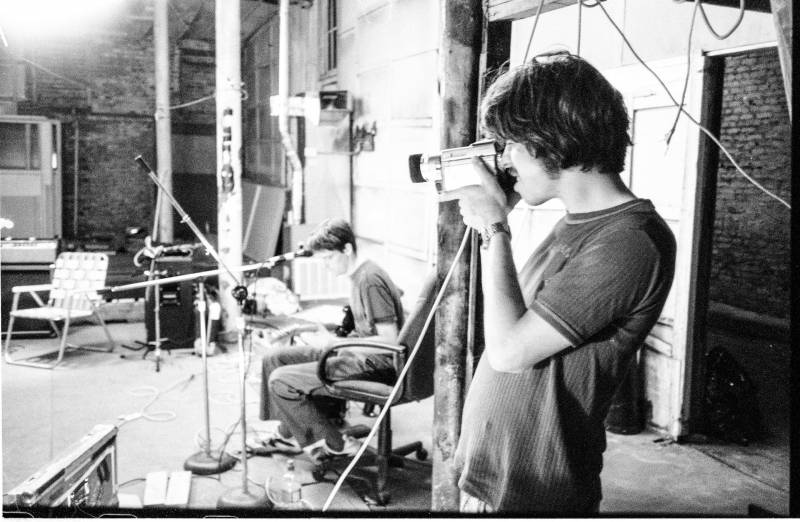One of the more intriguing sections featured in Slow Century concerns the tenure of the band’s original drummer, Gary Young. A Bay Area musician and owner of the studio in New York where the band’s first album was recorded, Young was also notable for being 15 years older than anyone else in the group, as well as for often performing shirtless, and for leaving his kit to perform handstands basically whenever he felt like it.
For Bangs, Young was part of the initial attraction that drew his camera to Pavement.
“I was always excited to film the band because their live presentation was inscrutable,” Bangs says. “It was baffling to try and figure out why what looked like a band of post-college guys of a certain age had this drummer, Gary Young. He was much more idiosyncratic and charismatic with what he was doing, in terms of his performance energy, compared with the more self-effacing, low-key approach of the other guys on stage. That was just such a visual mystery to try and figure out.”
As Slow Century chronicles, Young quit the band in 1993 in part due to issues with alcohol. Ultimately, Young would be invited to perform with Pavement when the group played shows in Stockton and Berkeley as part of their 2010 reunion tour.
Though the performances were well received, Nastanovich says the band’s reunion-within-a-reunion wasn’t a perfect fit.
“I’m not against ever doing it again if the situation were to arise,” Nastanovich says. “But in order to have a band with Gary Young, Gary Young has to be the focal point—at least in his own mind. He can’t just be some special guest, you know? That was sort of the downfall of his 2010. We wanted him to do more stuff but it just didn’t work.”
While Young’s time with Pavement was undoubtedly contentious, the band’s relationship to David Berman (Silver Jews, Purple Mountains), who tragically took his own life at the age of 51 last August, was something far more complex. Though Berman appears only briefly in the film, his influence is felt right away thanks to the fact that his words inspired the project’s title.
“He was always whispering in our ears,” Nastanovich says. “Believe me, if we were doing something that he found embarrassing, he would tell us. Unfortunately, now that he’s gone, we’re on our own.”
Nastanovich also expresses gratitude to Bangs, as well as the films other co-directors (there are six in total, including Sonic Youth’s Kim Gordon and Thurston Moore), for presenting the story in a way that felt, above all, honest.
It’s a sentiment reflected in Bangs’ decision to end the film with footage of Pavement performing the last three songs of their encore at London’s Brixton Academy in 1999 in its entirety. Prior to the band’s highly publicized reunion in 2010, the London concert had long served as the band’s final performance.
In response to fans who may take issue with the fact that Slow Century largely eschews the widely reported, acrimonious dissolution of the band, Nastanovich counters that any efforts to that effect would likely have failed spectacularly.
“It wouldn’t have worked to ask us then about why Pavement was coming to an end in interviews,” he says. “I think the sense of finality at the end was a good way to present this ‘See ya later, that was Pavement’ type feel because the band was over. I certainly knew it was over.”
In an intriguing twist of irony, this big-screen debut of a documentary ostensibly made about a band that ended 20 years ago will coincide with two Pavement concerts scheduled in Spain later this spring.
Asked if he’s excited to be reuniting with Malkmus and the rest of the band once more, Nastanovich says he’s currently focused on getting the Pavement frontman to send everyone a list of songs so they can start practicing.
“I’m trying to convince Stephen to make a setlist with the songs we need to learn,” he explains. “Instead of everyone having to learn 100 Pavement songs, I’m trying to get that down to like 40 so they don’t waste their time. That said, any opportunity to play Pavement shows for me is just like… basically, if we’re playing downtown Des Moines in an hour and a half, I’m ready.”
Pavement: Slow Century screens on Wednesday, Feb. 26, at 6:45 p.m, followed by a Q&A with Lance Bangs and Bob Nastanovich at The Roxie in San Francisco. Details here.


